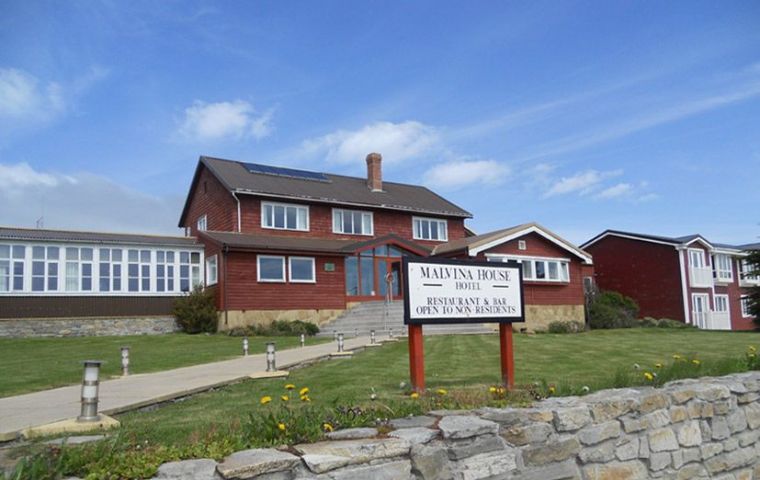MercoPress. South Atlantic News Agency
Falklands’ individual average annual income totals £ 20.100, shows Census
 Government is the main employer but tourism also has a significant share
Government is the main employer but tourism also has a significant share The individual average annual income of the Falkland Islands residents totals £ 20.100 (approx 32.000 US dollars) according to data from the latest 2012 Census, which also showed an exceptionally high economic activity rate and a very tight labour market with just 1% unemployment and 20% of residents with a second job.
The Census showed that in the capital Stanley the average individual annual income was higher at £20,600, whilst in Camp average incomes are 10% lower, averaging £18,400. This refers to all persons aged 16 and over, and includes the retired and people not working.
However these averages mask significant variations in income levels across society - almost half of all residents (49.2%) report an annual income of less than £15,000 (with almost 12% reporting income of less than £5000).
Most retirees report incomes of less than £15,000 per annum, however fully two thirds of all persons reporting incomes of less than £15,000 per annum also report that they are employed.
Unsurprisingly, average incomes for persons in employment are higher. Overall, the average income for employed people was £22,400. Again, average incomes for employment were higher in Stanley (£23,300) than in Camp (£21,100).
The Census also reveals that the Falkland Islands has an exceptionally high economic activity rate – at 83.6% (compared to a level of 76% in the UK). The economic activity rate for males is higher still at 87.5%. This reflects the larger proportion of the female population who are retired or who are not working for other reasons (such as homemakers, family carers etc).
The ‘economically active’ population refers to all persons over the age of 15 who are in employment or who are actively seeking work. This includes persons who are self-employed, those working part-time and those who are unemployed.
The Census also highlights the tight labour market within the Falklands: the unemployment rate is 1% indicating that there is virtually no spare capacity within the labour market to accommodate any additional employment opportunities that may arise in the future. Indeed, almost 20% of persons in employment have more than one job.
The Census asked all persons in employment (whether employees or self-employed) to identify the economic activity they were engaged in.
The largest employment sector on the Islands remains the Falkland Islands Government – accounting for 28% of all employment. Other significant employers in the Islands are agriculture (11%), hospitality and tourism (11%) and transport and communications (12%).
Employment in the agricultural industry continues to decline since 2006 with 189 employees in 2012 (down from 205 in 2006).
“Tourism” was self-selected by a number of residents as their primary economic activity. In strict definitional terms this is not an “industry” hence additional jobs in the tourism sector are included in other categories, such as transport. It is also noteworthy that a significant number of individuals also reported having a second job, with the largest number of such individuals reporting that their secondary employment was in the tourism sector.




Top Comments
Disclaimer & comment rules-

-

-

Read all commentsDanyBerger, look how much us “squatters” are earning! I wonder what the average wage in Argentina is? Let's not forget about factoring in Argentina's wildly high inflation which eats away at people's earnings! But thats right, because the Falklands doesnt have Italian sports cars, $50m hospitals or skyscrapers, we must be poor!
Sep 12th, 2012 - 04:12 pm 0@1.
Sep 12th, 2012 - 04:24 pm 0Well said.
A $50m hospital isn't much to shout about. I worked in a London teaching hospital 20 years ago and it cost £500m to build and £500m to run every year. Probably double that nowadays.
Sep 12th, 2012 - 04:50 pm 0Commenting for this story is now closed.
If you have a Facebook account, become a fan and comment on our Facebook Page!